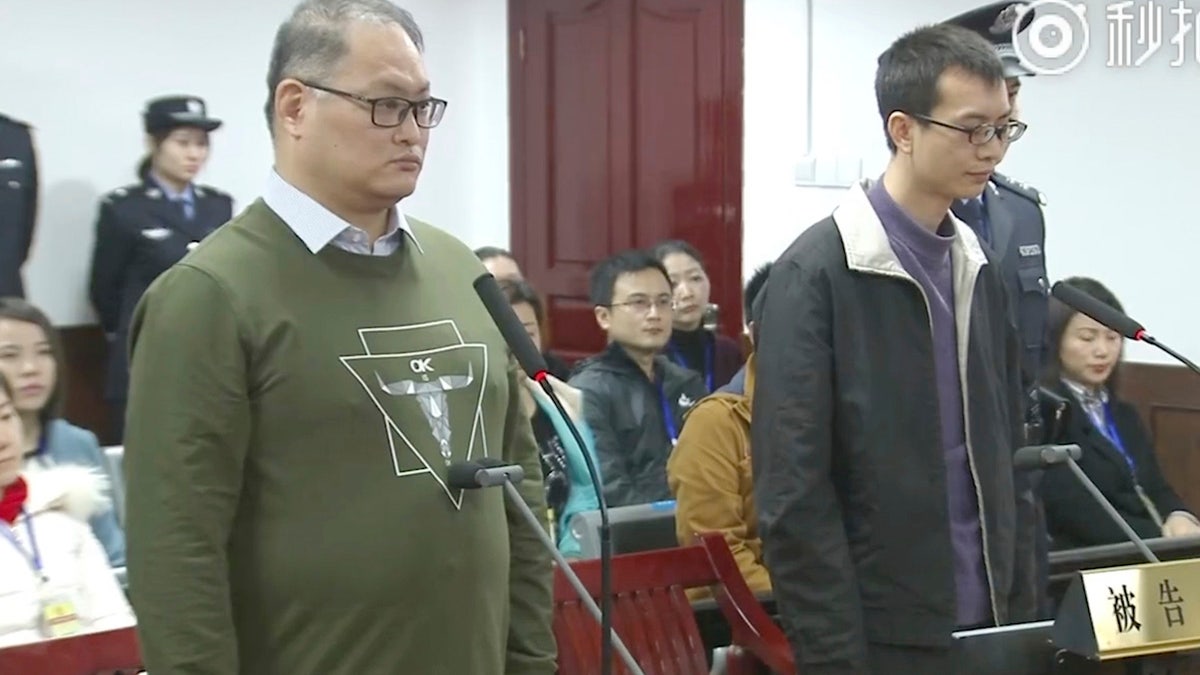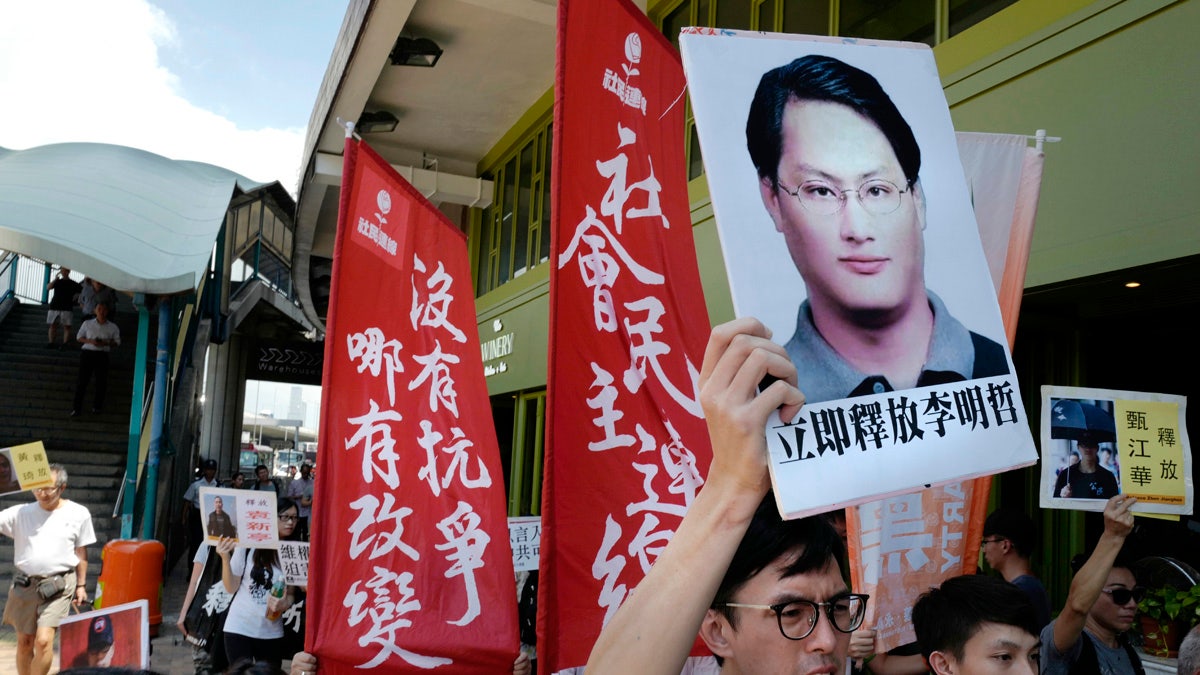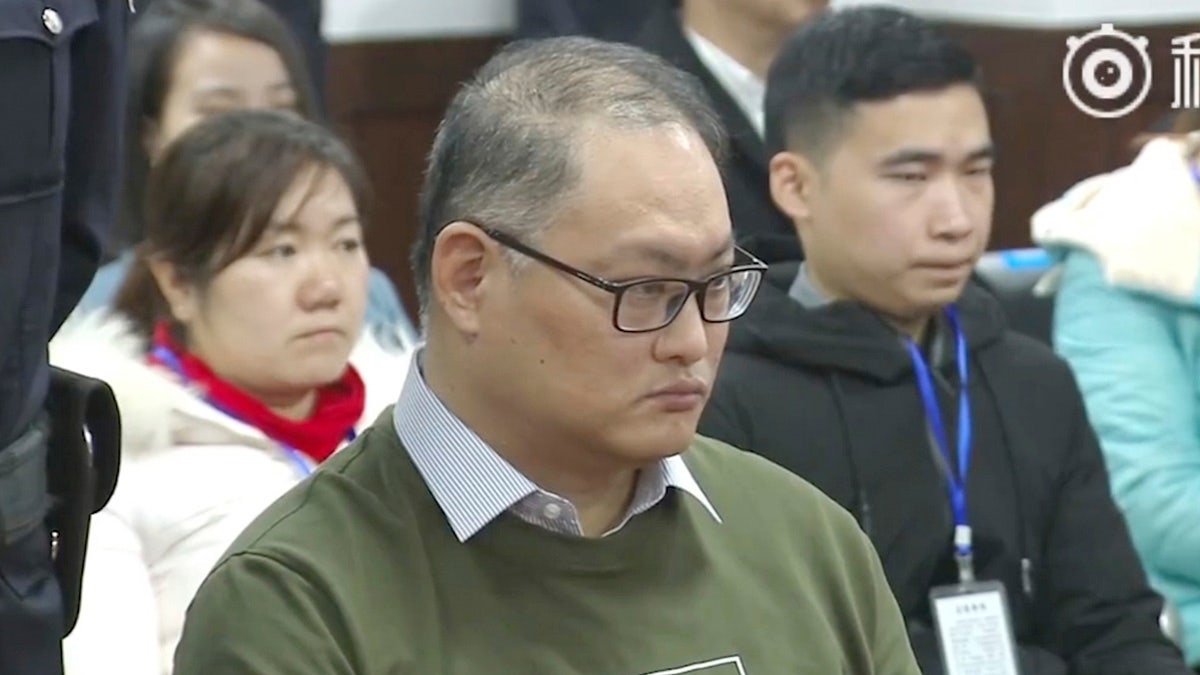
Taiwanese activist Lee Ming-che, left, and his fellow defendant Peng Yuhua of China stand at the Intermediate People's Court of Yueyang. (AP)
A Taiwanese activist was sentenced in China to five years in prison Tuesday for holding lectures online and assisting the families of jailed dissidents in a sign of how Beijing's crackdown on human rights extends beyond its borders.
The trial of Lee Ming-che was also China's first known criminal prosecution of a nonprofit group worker since Beijing passed a law last year tightening controls over foreign nongovernmental organizations.
The new law passed in April 2016 says foreign NGOs must not endanger China's national security and ethnic unity, and places nonprofits under close police supervision.
The Yueyang City Intermediate People's Court in central China handed down the sentence against Lee after finding him guilty of subversion of state power. The Associated Press reported Lee had confessed during his trial in September, which his wife, Lee Ching-yu, dismissed as "a political show."
Lee's co-defendant, Peng Yuhua, who is from mainland China, was sentenced to seven years in prison. Peng had also pleaded guilty, saying he had founded an organization called Palm Flower Co. to pressure China to accept a multiparty political system and that Lee was his deputy in charge of education.
Lee's wife attended the sentencing. "A price must be paid in the pursuit of an ideal," she said in a statement issued through her supporters. "Striving for human rights for the underprivileged is a necessary dedication to promoting the progress of human civilization."

In this Sept. 11, 2017, file photo, a protester raises a picture of Taiwanese activist Lee Ming-che during a demonstration outside the Chinese liaison office in Hong Kong. (AP)
Supporters say that since the trial ended, Lee Ching-yu has been prevented from leaving her hotel room or meeting with anyone. Calls to her cellphone rang unanswered.
Subversion of state power is a vaguely defined charge often used by Chinese authorities to muzzle dissent and imprison critics. Both men said they would not appeal.
Taiwan, a self-governing island Beijing regards as part of Chinese territory, swiftly condemned the sentence.
"The spread of democratic ideas is innocent!" Alex Huang, the spokesman for Taiwanese President Tsai Ing-wen, said in a statement. Huang urged Beijing to release Lee as soon as possible and allow him to return to Taiwan.
CHINA JAILS PROMINENT HUMAN RIGHTS LAWYER FOR 2 YEARS FOR 'INCITING SUBVERSION'
"We cannot accept that Lee Ming-che has been convicted of 'state subversion' for sharing ideas of freedom and democracy out of concern for the development of mainland China's civil society and democracy," the statement said.
Taiwan's Cabinet-level Mainland Affairs Council said in a statement that it would not accept the verdict and that the government would continue working to secure Lee's release from China.
Lee Ming-che, 42, cleared immigration in the semi-autonomous Chinese territory of Macau on March 19 and never showed up for a planned meeting later that day with a friend in the mainland Chinese city of Zhuhai.
He had previously conducted online lectures on Taiwan's democratization and managed a fund for families of political prisoners in China.
Lee's sentence was "incredibly harsh," given the accusations against him and the lack of evidence, said Maya Wang, Human Rights Watch's Hong Kong-based researcher.

In this image taken from video released on Nov. 28, 2017, by the Intermediate People's Court of Yueyang, Taiwanese activist Lee Ming-che sits during a court session at the Intermediate People's Court of Yueyang in Yueyang in central China's Hunan Province, Tuesday, Nov. 28, 2017. (AP)
"It's probably designed as a warning to activists based outside China, particularly those in Hong Kong and Taiwan," as Chinese President Xi Jinping's crackdown on dissent radiates beyond its borders, Wang said in an email.
Relations between Taiwan and China have been near an all-time low since the election of Tsai, whose party has advocated Taiwan's formal independence. China cut off contacts with Taiwan's government in June of last year, five months after Tsai was elected.
The Associated Press contributed to this report.
